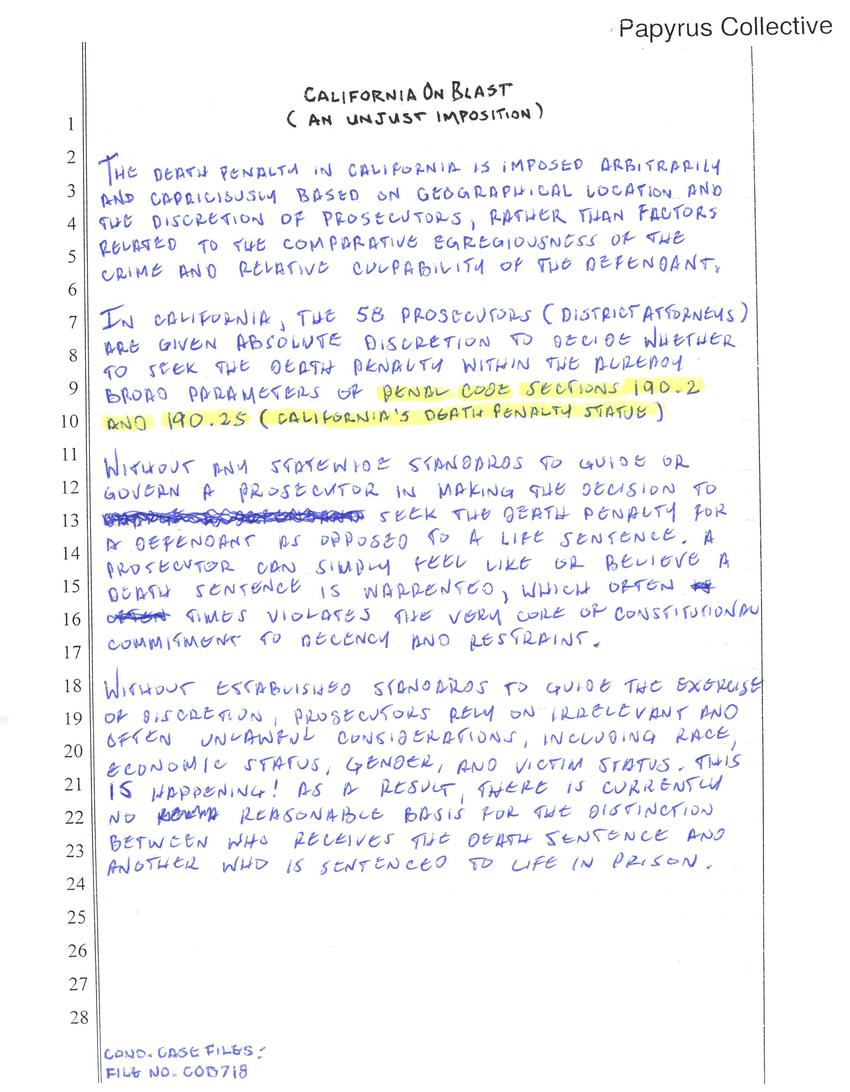

Transcription
California on Blast
An Unjust Imposition
The death penalty in California is imposed arbitrarily and capriciously based on geographical location and the discretion of prosecutors rather than factors related to the comparative egregiousness of the crime and relative culpability of the defendant.
In California, the 58 prosecutors (district attorneys) are given absolute discretion to decide whether to seek the death penalty within the already broad parameters of penal code sections 190.2 and 190.25 (California's death penalty statue).
Without any statewide standards to guide or govern a prosecutor in making due decision to seek the death penalty for a defendant as opposed to a life sentence, a prosecutor can simply feel like or believe a death sentence is warranted, which oftentimes violates the very core of constitutional commitment to decency and restraint.
Without established standards to guide the exercise of discretion, prosecutors rely on irrelevant and often unlawful considerations, including race, economic status, gender, and victim status. This is happening! As a result, there is currently no reasonable basis for the distinction between who receives the death sentence and another who is sentenced to life in prison.
Cond.Case Files:
File No. COD718

Other posts by this author
|
2023 jun 11

|
2023 may 31

|
2023 may 4

|
2023 may 1

|
2023 apr 30

|
2023 apr 19

|
More... |



Replies (6)
An Unjust Imposition
The death penalty in California is imposed arbitrarily and capriciously based on geographical location and the discretion of prosecutors rather than factors related to the comparative egregiousness of the crime and relative culpability of the defendant.
In California, the 58 prosecutors (district attorneys) are given absolute discretion to decide whether to seek the death penalty within the already broad parameters of penal code sections 190.2 and 190.25 (California's death penalty statue).
Without any statewide standards to guide or govern a prosecutor in making due decision to seek the death penalty for a defendant as opposed to a life sentence, a prosecutor can simply feel like or believe a death sentence is warranted, which oftentimes violates the very core of constitutional commitment to decency and restraint.
Without established standards to guide the exercise of discretion, prosecutors rely on irrelevant and often unlawful considerations, including race, economic status, gender, and victim status. This is happening! As a result, there is currently no reasonable basis for the distinction between who receives the death sentence and another who is sentenced to life in prison.
Cond.Case Files:
File No. COD718
Share this
An Unjust Imposition
The death penalty in California is imposed arbitrarily and capriciously based on geographical location and the discretion of prosecutors rather than factors related to the comparative egregiousness of the crime and relative culpability of the defendant.
In California, the 58 prosecutors (district attorneys) are given absolute discretion to decide whether to seek the death penalty within the already broad parameters of penal code sections 190.2 and 190.25 (California's death penalty statue).
Without any statewide standards to guide or govern a prosecutor in making due decision to seek the death penalty for a defendant as opposed to a life sentence, a prosecutor can simply feel like or believe a death sentence is warranted, which oftentimes violates the very core of constitutional commitment to decency and restraint.
Without established standards to guide the exercise of discretion, prosecutors rely on irrelevant and often unlawful considerations, including race, economic status, gender, and victim status. This is happening! As a result, there is currently no reasonable basis for the distinction between who receives the death sentence and another who is sentenced to life in prison.
Cond.Case Files:
File No. COD718
An Unjust Imposition
The death penalty in California is imposed arbitrarily and capriciously based on geographical location and the discretion of prosecutors rather than factors related to the comparative egregiousness of the crime and relative culpability of the defendant.
In California, the 58 prosecutors (district attorneys) are given absolute discretion to decide whether to seek the death penalty within the already broad parameters of penal code sections 190.2 and 190.25 (California's death penalty statue).
Without any statewide standards to guide or govern a prosecutor in making due decision to seek the death penalty for a defendant as opposed to a life sentence, a prosecutor can simply feel like or believe a death sentence is warranted, which oftentimes violates the very core of constitutional commitment to decency and restraint.
Without established standards to guide the exercise of discretion, prosecutors rely on irrelevant and often unlawful considerations, including race, economic status, gender, and victim status. This is happening! As a result, there is currently no reasonable basis for the distinction between who receives the death sentence and another who is sentenced to life in prison.
Cond.Case Files:
File No. COD718
Share this: 1 Favorite
Replies (2) Replies feed
Shadowscribe Pos
California on Blast
An Unjust Imposition
The death penalty in California is imposed arbitrarily and capriciously based on geographical location and the discretion of prosecutors rather than factors related to the comparative egregiousness of the crime and relative culpability of the defendant.